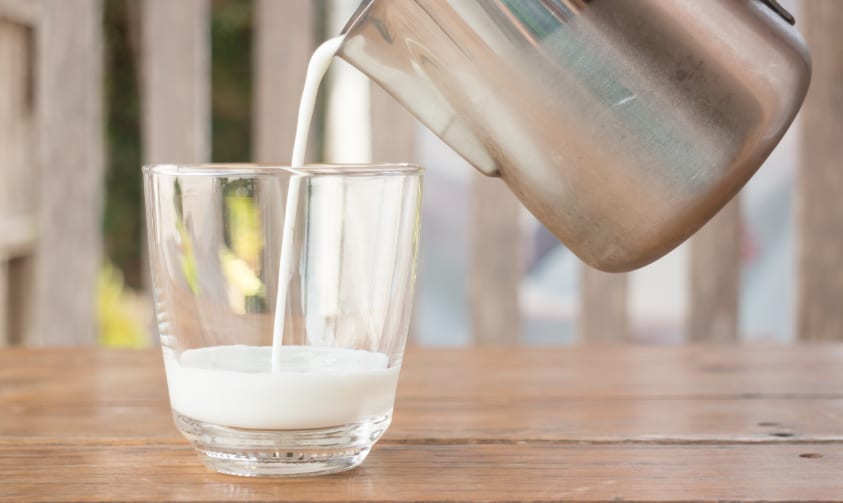It is fair to say that summer is not a good time to store foods that need a cool environment to survive, and milk is one of them.
Milk spoils quickly in summer because the room temperature during summer is more than 45 degrees Fahrenheit and milk cannot sustain for a long time at this temperature.
It can only remain fresh when kept in a cold environment, not a warm one.
In this article, we will be discussing how, why, and what makes milk spoils quickly during the summer.
I am sure we all know that summer comes with high temperatures ranging from 34-39 degrees Celsius.
At this temperature, it is easy for bacteria to function, multiply, and act on milk, which will cause it to spoil.
Milk sugar is also known as lactose is present in milk and can be fermented with ease by a bacterium and form lactic acid; this will cause the milk to have a sour smell.
This is the primary reason why summertime is not suitable for milk, and they can get spoilt quickly if left outside for too long.
With that being said, let us discuss further.
The proper temperature for milk is around 45 degrees Fahrenheit, as this is a preferable condition for its storage.
Be careful not to allow the temperature to get below 33 degrees as a considerable change in temperature can cause milk to spoil quickly.
If milk is not refrigerated during summer, it will not take long for it to spoil because of a proliferation of bacteria.
Bacteria like lactobacilli and lactococci can breed when there is a continuous shift in temperature.
As I said earlier, milk will spoil when lactic acid is produced after the bacteria converts lactose to glucose.
This acid creates a thick layer and forms a curd, which within 24 hours, will cuddle the milk.

How to find if the milk is good for use?
Check to see if your milk has curdled around the bottom of the container you stored it in.
If this happens, such milk is said to be spoil and should either be discarded or used for other purposes.
We can employ specific ways to stop or delay the decomposition of milk by bacteria, and they are as follows.
- Pasteurize it
- Sterilize it
- Dry it
- Cool it
- Acidify it
- Place in cans just the same way condensed milk is kept (as evaporated and condensed milk)
Why is milk stored in the refrigerator during the summer?
Milk is stored in the refrigerator during summer to increase the shelf life.
As milk always needs to be chill, a slight change in temperature can lead to a change in the milk’s chemical structure.
We all know that heat comes with summer and we should avoid exposing milk to the hot room temperature.
Therefore, a refrigerator is necessary during summer as it can maintain a suitable temperature for the milk and keep it consumable for a longer duration.
So, when summer comes, ensure you put your milk in the refrigerator immediately after you use it.
If you leave it out for too long, bacteria may begin to act on it and eventually spoil the milk.
Why does milk spoil faster at higher temperatures?
At higher temperatures, the bacteria in milk grow faster because they are in a proper environment for their multiplication. This is the reason why milk spoils easily in the monsoon than in the winter season.
The growth of these bacteria has a direct link to the environment of the milk, so if you want to save your milk from bacterial degradation, store it in proper conditions and do not let it come into contact with the high temperatures of summer else the milk will turn sour.
You can either store the milk in a cool place at room temperature, or in a refrigerator.
How to properly store milk for longer?
When storing milk, the container must be clean. When you smell it there should not be any foul odor that could indicate spoilage.
The containers can be cleaned by washing them with warm water and soap and make sure to dry them before storing them.
The container must be clean before putting the milk inside it, as the container can carry a lot of germs on it. There should be no cracks on the vessel, as any leakages may lead to contamination of milk.
Related:
Why pasteurization prevents spoilage of milk?
Milk is more susceptible to spoilage than other types of food because it contains high concentrations of lactose, a sugar that can rot and produce the bad smells associated with spoiled milk.
Pasteurization reduces the number of microbes in milk by heating the milk to kill off any bacteria or harmful microorganisms.
Pasteurization is generally effective in killing most types of bacteria, but there are exceptions. In the event of gross contamination, pasteurized milk can still develop spoilage.


